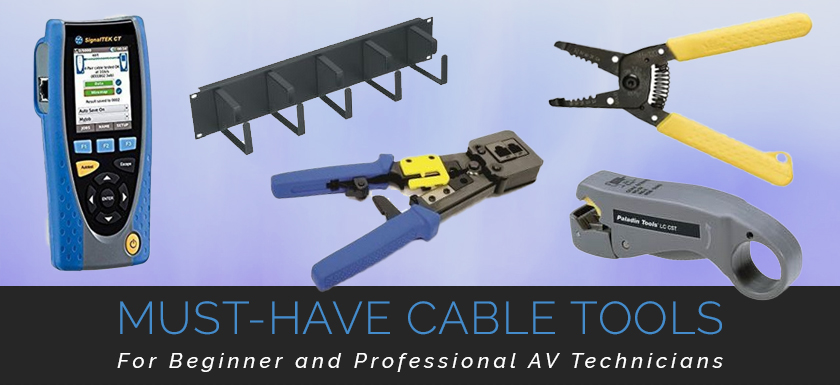
As an AV or network professional, you’ll need a variety of cable tools to help you install and maintain your audio, video and network cabling. These cable tools can be used to install cables, test cables, connect and disconnect cables, and troubleshoot connectivity problems.
There are a variety of cabling tools available to help make your cabling projects go smoothly. From simple but important items like wire cutters and cable strippers, to more complex products like cable testers and cable management systems, the right cabling tools can make all the difference in achieving a successful project result.
When choosing cabling tools, it’s important to consider the specific needs of your project. For example, if you’re working with data cabling, you’ll need different tools than if you’re installing audio or video cabling. Make a list of the specific tasks you’ll need to complete, and then select the cabling tools that will help you get the tasks done quickly and efficiently.
Below, we cover essential cable tools that every AV pro should carry in their cable organizer!
Must-Have Cable Tools for Pro AV Technicians
Cable Cutter / Wire Cutter
A cable or wire cutter is used to cut cabling or wires, to the desired length.
The main difference between cable cutters and wire cutters is the size of the cutting jaws. Cable cutters have much larger cutting jaws that are designed to cut through thicker cables, while wire cutters have smaller cutting jaws that are designed for thinner wires. Additionally, cable cutters typically have handles that are about twice as long as those on wire cutters, which provides additional leverage when cutting through thicker cables.
There are many different types of cable/wire cutters, each designed for cutting specific types of cables and wires. It’s important to get a good quality cutter that can make clean, precise cuts.
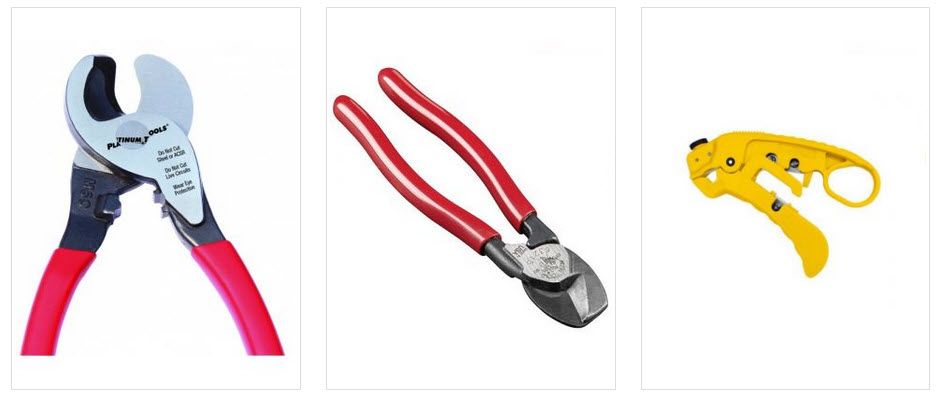 Shop Cable Cutters
Shop Cable Cutters
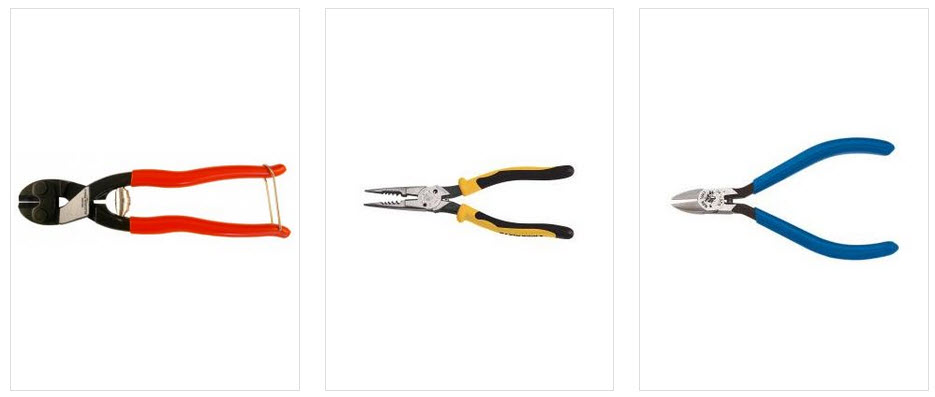 Shop Wire Cutters
Shop Wire Cutters
Cable Stripper / Wire Stripper
A cable or wire stripper is a tool that is used to strip the insulation or the outer jacket off of cabling or wire so that the conductor or inner wires can be exposed. This is necessary when you are connecting or disconnecting cables/wires.
The main difference between a cable stripper and a wire stripper is the size of the tool. A cable stripper is designed for larger cables, while a wire stripper is designed for smaller wires. Cable strippers typically have longer handles and bigger jaws, while wire strippers have shorter handles and smaller jaws. Cable strippers may also have a built-in cutter, while wire strippers most often do not.
There are various types of cable strippers available, so make sure you get one that is designed for the type of cabling or wire you’re working with.
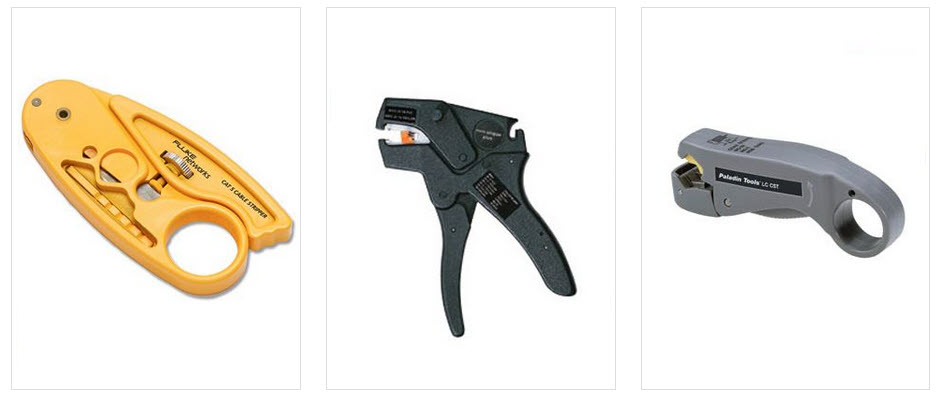 Shop Cable Strippers
Shop Cable Strippers
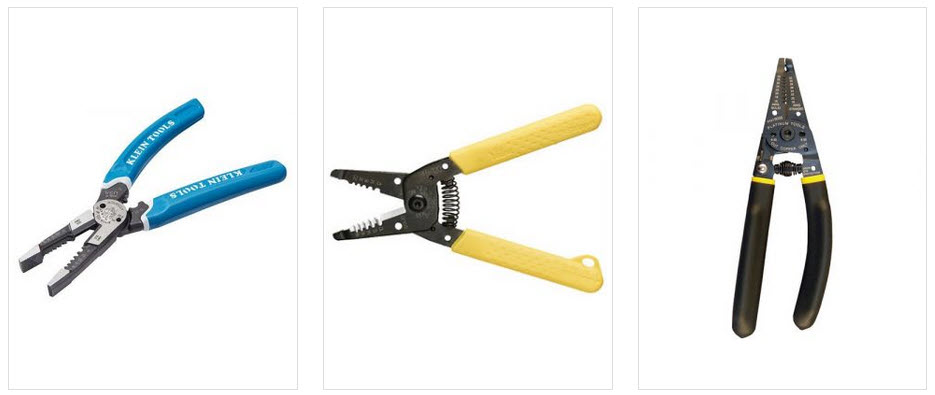 Shop Wire Strippers
Shop Wire Strippers
Cable Crimper
Another important cable tool, a hand-held crimping tool is used to connect wires and cables together and attach connectors onto a cable. Cable crimpers are an essential tool for electricians, as they allow for the quick and easy termination of electrical wires. They are also used by hobbyists and do-it-yourselfers when working on electrical projects.
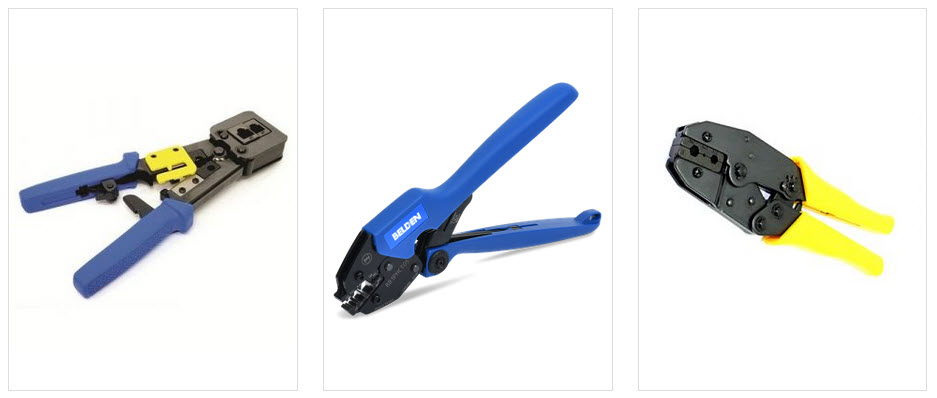 Shop Crimp Tools
Shop Crimp Tools
Punch Down Tool
A punch down tool is an essential part of any installer or technician’s toolkit. It is used to connect wiring to terminal blocks, and to connect network cables to wall jacks and patch panels in a quick and easy way. Punching down and pushing wires into connectors with a punch down tool is much faster than using a screwdriver, and it ensures that the connection is secure.
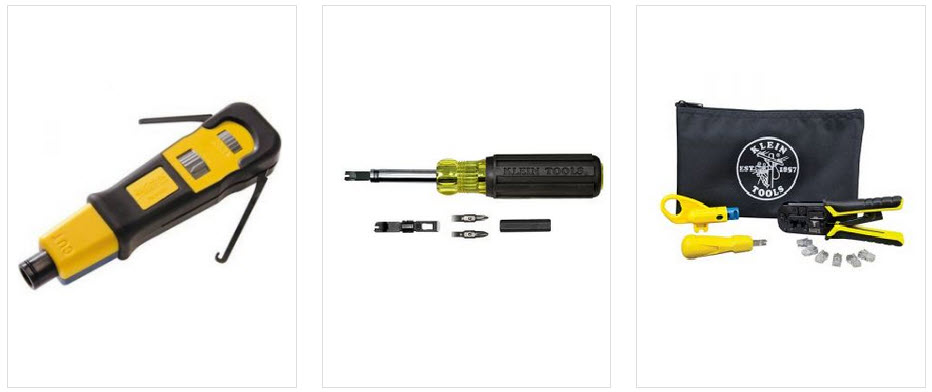 Shop Punch Down Tools
Shop Punch Down Tools
Cable Tester
A cable tester is a handheld device used to test cabling for continuity and other electrical faults. Cable testing can be done on either short or long lengths of cable, and it can be used to test for continuity, shorts, or open circuits on a variety of different types of cables, including Ethernet cables, USB cables, HDMI cables, and more. Cable testers come in a variety of different styles and designs, but they all serve the same purpose: to help ensure that a cable is functioning properly.
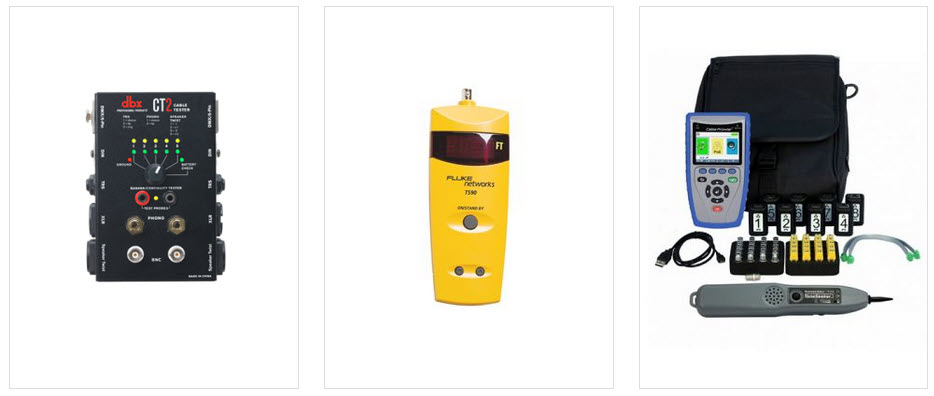 Shop Cable Testers
Shop Cable Testers
Cable Management Tools
Cable management tools, such as zip ties and Velcro straps, are used to keep AV and network cables organized and tidy, both behind equipment and along walls and floors. This helps to prevent problems caused by tangled or loose cables.
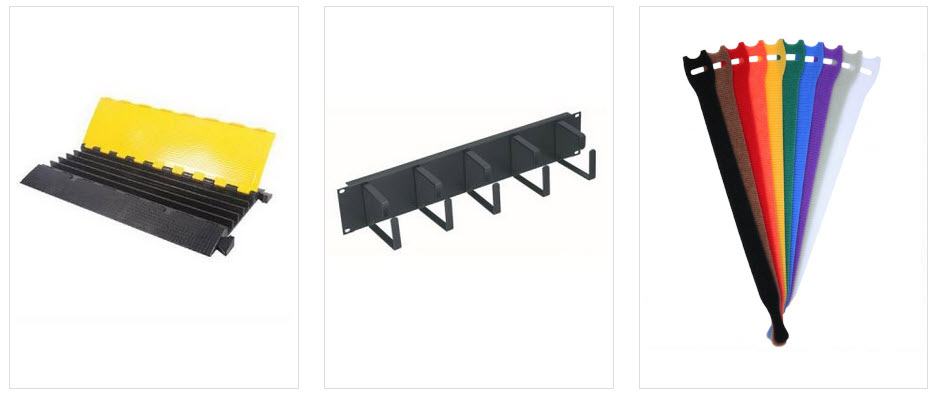 Shop Cable Management
Shop Cable Management
Cable Tools for Wired Networks
A wired network is a type of computer network that uses wired connections to send and receive data, and is best suited for applications where speed and reliability are critical, such as in business or industrial settings.
Wired networks are typically faster and more reliable than wireless networks, but they can be more difficult to set up and maintain, which is why having the right cable tools for installation and maintenance is paramount.
Wired networks are typically composed of a series of nodes, or devices that are connected by physical cables made from a variety of materials, including copper, fiber optic, and twisted pair. They are faster than wireless networks because they have more dedicated bandwidth, meaning that data can be transmitted between nodes at a higher rate.
They are also generally more reliable than wireless networks because there is no interference from other devices or environmental factors. Wired networks are also more secure than wireless networks because it is more difficult for unauthorized users to access the network.
Cable Tools for Network Cabling
As an increasing number of businesses move away from conventional phone lines and gravitate towards VoIP (Voice over IP) systems, the need for network cabling has increased. While many homes are now wired with Ethernet cable to support gaming consoles and streaming devices, commercial buildings have been making the switch to IP-based phone systems for years. If you’re looking to install or upgrade your network cabling, there are a few things you need to know.
The most important factor in network cabling is bandwidth. This is the amount of data that can be transferred between two points in a given amount of time, and it’s measured in megabits per second (Mbps). The higher the bandwidth, the more data can be transferred, which is why it’s important to choose the right cable for your residential or commercial AV needs, and the right cable tools to get the job done right.
Installing network cabling can be a complex task, but it’s an essential part of any VoIP system. With the right planning and execution, you can ensure that your AV installation has the connectivity it needs to function at its best.
Choosing the Best Cable Tools
Investing in high-quality cabling tools will pay off in the long run by helping you complete projects more quickly and efficiently.
At Pacrad, we have an incredible collection of high-quality branded cable tools and testers at competitive prices. With the right cabling tools on hand, you’ll be ready for any cabling project that comes your way — no matter how big or small!
